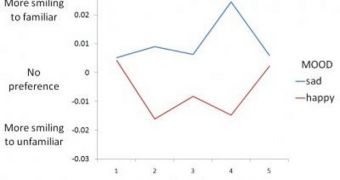Researchers studying human behavior have recently made a finding that applies to all people, regardless of age. From toddlers to the elderly, individuals tend to neglect the new and stick with familiar things when feeling ill-disposed. Infants will cling to their mother's foot, whereas adults will always prefer having dinner at the same familiar place, rather than traveling across town to find a new restaurant. This holds true when people are sick, sad, or simply in a bad mood, and the behavior changes when the individuals revert to a happier state, e! Science News reports.
When it comes to children, for example, a well-fed, healthy, and taken-care-of kid will always set off exploring his or her surroundings, taking in a wealth of new experiences. However, the same does not hold true when they are sick or sad. With the new study, an international team of social and cognitive psychologists believes it may have found the reason for this type of behavior. The investigators say that negative emotions appear to impart what they refer to as a “warm glow” on familiar things, making new experiences unattractive.
What is so amazing about this research is that it is the first to demonstrate this experimentally. It has also proven that, when people feel good, the familiar falls under the “common and boring” category, and that this is one of the main reasons why healthy individuals set out looking for new experiences whenever they are up to it. The new paper, which appears in the latest issue of the journal Psychological Science, was authored by Piotr Winkielman, a psychology professor at the University of California in San Diego, together with Leiden University Medical Center expert Marieke de Vries, who has been its first author.
“The research helps us understand, too, why incumbent politicians seeking re-election fuel a negative, apprehensive mood and then offer up such tried-and-true symbols as the flag and apple pie,” Winkielman says. “We thought the value of familiarity would depend on the context. Familiarity signals safety, which is pleasant in an unsafe or stressful context but might actually get boring when all is going fine,” de Vries reveals. “When you're happy, known things, familiar things lose their appeal. Novelty, on the other hand, becomes more attractive,” the UCSD expert concludes.

 14 DAY TRIAL //
14 DAY TRIAL //